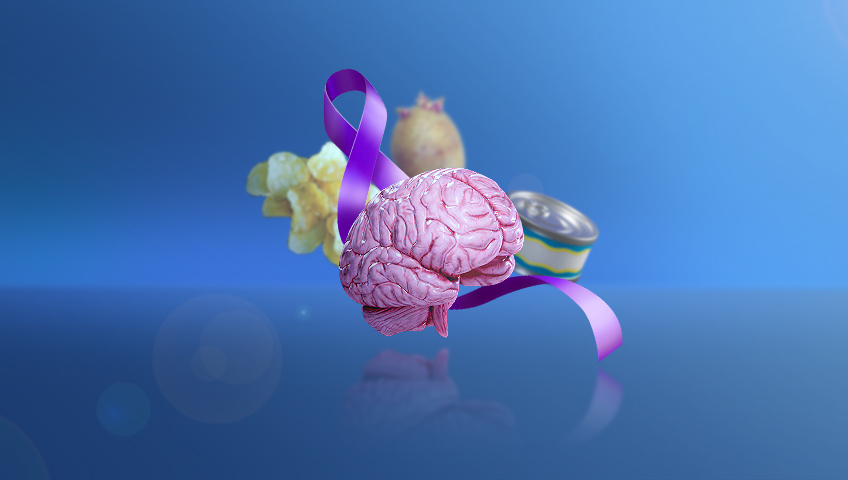2025.12.09
History of Alzheimer's Disease Discovery
Before the 20th century, memory problems and cognitive decline in elderly individuals were usually considered part of the natural aging process and were not recognized as an independent disease. Dr. Alois Alzheimer, a German physician and psychiatrist, was a pioneer in exploring the connection between disease symptoms and brain changes. He attempted to show that changes in the brain could lead to memory and behavioral problems.
In 1906, Dr. Alois Alzheimer described the symptoms of a 51-year-old patient who suffered from severe memory loss and behavioral issues. After the patient's death, he examined her brain and discovered abnormal changes in various parts. This examination revealed that these issues were caused by abnormal changes in the brain and were not merely due to aging. This discovery established Alzheimer as a pioneer in the study of brain diseases.
At the time, Dr. Alzheimer's discovery did not garner much attention, but in 1910, Dr. Emil Kraepelin, Dr. Alzheimer's colleague, named the disease after him as "Alzheimer's disease." This action officially recognized Alzheimer's as an independent disease, prompting extensive research in the field.
Alzheimer's Disease
Alzheimer's disease is the most common form of dementia, gradually leading to the degeneration of brain cells and, over time, affecting memory, thinking, and decision-making abilities. According to the World Health Organization (WHO) in 2023, 60 to 70 percent of dementia cases are related to Alzheimer's disease. This disease progresses slowly; in the early stages, mild memory or thinking problems may appear, but over time, these issues become more severe, disrupting the individual's ability to perform daily tasks. In advanced stages, even basic abilities like speaking or performing simple tasks may be lost.
Alzheimer's disease is primarily observed in people over the age of 65. According to the Alzheimer's Association, after this age, the risk of developing Alzheimer's doubles every five years. By the age of 85, one in three individuals will have the disease. However, Alzheimer's is not a natural part of the aging process. While mild memory changes are natural with age, Alzheimer's is a progressive and serious disease that gradually destroys brain cells and impairs cognitive functions.

Symptoms of Alzheimer's Disease
An individual with Alzheimer's may experience one or more of the following symptoms:
- Memory loss: One of the first and most common symptoms. Individuals may forget recent activities or ask repetitive questions.
- Confusion about time and place: Patients may have trouble recognizing familiar places or determining time and dates.
- Difficulty performing daily tasks and planning: Activities that were once simple, such as cooking or managing finances, become increasingly difficult, and planning for daily tasks becomes challenging.
- Inability to communicate: The individual may struggle to find the right words or follow conversations.
- Impaired judgment and decision-making: The individual may have trouble making everyday decisions, such as neglecting personal care.
- Misplacing objects: Patients may place objects in unusual locations and be unable to find them.
- Changes in mood and personality: Individuals may experience mood changes, such as depression, anxiety, or restlessness, and may display unusual behaviors.
Factors Influencing Alzheimer's Development
Several factors can increase the risk of developing Alzheimer's, including:
- Age is One of the most significant factors. With aging, changes such as reduced brain capacity to repair damaged cells, the accumulation of abnormal proteins, and reduced blood flow to the brain occur, making the brain more vulnerable to damage and increasing the likelihood of Alzheimer's.
- If a close relative (such as a parent or sibling) has Alzheimer's, the risk of developing the disease increases.
- Severe head injuries, especially at older ages, can also increase the risk of Alzheimer's.
- Air pollution, particularly from vehicle emissions and wood burning, contains fine particles and pollutants such as soot, heavy metals (lead, mercury, arsenic), sulfates, nitrates, volatile organic compounds, and dust. These particles enter the body through the respiratory system, reach the bloodstream, and are transferred to the brain, damaging nerve cells and leading to the destruction of brain tissue. These processes can increase the likelihood of developing and progressing neurological diseases like Alzheimer's.
- Heart health: According to the Alzheimer's Association, heart and brain health are closely related, as proper blood flow and oxygen delivery to the brain depend on the heart's performance. Any impairment in heart function, such as high blood pressure or diabetes, can reduce blood flow to the brain and increase the risk of Alzheimer's.
- Diet also plays a role. Consumption of unhealthy foods high in saturated and trans fats, sugars, and processed foods can gradually damage brain health and increase the risk of Alzheimer's.
Methods for Preventing Alzheimer's
Preventing Alzheimer's is possible by making targeted lifestyle changes, such as:
- Mental activities, including learning new skills (e.g., a new language), solving complex problems (e.g., crossword puzzles), and engaging in mind-challenging games (e.g., chess or Sudoku), can improve cognitive abilities and strengthen brain function.
- Regular exercise, such as walking and swimming, reduces the risk of Alzheimer's by improving blood flow and strengthening nerve cells.
- Managing stress through methods like meditation and yoga is crucial, as chronic stress can damage brain cells.
- Sufficient sleep is essential for brain health. Lack of sleep may increase the risk of Alzheimer's. Maintaining a regular sleep pattern and avoiding electronic devices before bed can improve sleep quality and protect the brain.
- Controlling risk factors such as high blood pressure, diabetes, and cholesterol plays a significant role in preventing brain damage and reducing the risk of Alzheimer's.
- Diet is one of the most effective methods for preventing Alzheimer's. Choosing the right foods reduces inflammation and prevents brain damage, preserving brain health and lowering the risk of this disease.

The Impact of Diet on Alzheimer's
Some foods can reduce blood flow to the brain, leading to less oxygen and fewer nutrients reaching the brain. This deficiency weakens brain cells and increases the risk of Alzheimer's.
Additionally, some foods can transform temporary inflammation, a natural response to infection or injury, into chronic inflammation. Chronic inflammation, instead of aiding recovery, damages body cells, including brain cells, and increases the risk of Alzheimer's.
Furthermore, some foods increase the production of free radicals, which are unstable molecules naturally produced in the body. Normally, the body neutralizes these harmful radicals using antioxidants, but when their number becomes excessive, the body cannot control them. This situation leads to oxidative stress, which damages brain cells and increases the risk of Alzheimer's disease.
On the other hand, foods containing antioxidants and anti-inflammatory compounds can protect the brain from damage caused by free radicals and chronic inflammation, significantly reducing the risk of Alzheimer's. Regular consumption of these foods not only helps improve memory and concentration but also protects brain cells from various damages.
-
Foods That Threaten Brain Health:
-
Saturated and trans fats: These fats, found in fried foods, fast foods, and pastries, reduce blood flow and limit oxygen delivery to the brain, increasing the production of free radicals. These unstable molecules damage brain cells and, by exacerbating oxidative stress, increase the risk of cognitive decline and Alzheimer's disease.
- Added sugars: Added sugars found in sweetened drinks such as sodas and processed foods such as cakes and pastries cause sharp fluctuations in blood sugar levels. For example, the regular consumption of sweetened sodas leads to a rapid increase in blood sugar levels, followed by a sharp drop. Over time, these blood sugar fluctuations stimulate the production of free radicals, which are associated with an increased risk of Alzheimer's and cognitive decline.
- Ultra-processed foods: These foods, such as packaged chips, sausages, hot dogs, and ready-made meals, contain preservatives and artificial additives that can increase chronic inflammation and the production of free radicals. Therefore, the frequent consumption of ultra-processed foods damages brain cells over time, and this damage can lead to decreased brain health and an increased risk of Alzheimer's and other neurological diseases.
- Foods with high mercury levels: Large fish, such as sharks and tuna, contain high levels of mercury, which can harm various parts of the brain. The consumption of these fish should be limited to reduce the risk of neurological damage.
- Green and sprouted potatoes: Green potatoes contain solanine, a neurotoxic compound that can damage the brain and impair its function.
-
Foods That Help Strengthen and Protect the Brain:
-
Vegetables: Vegetables such as spinach and kale are rich in vitamins E and K. Vitamin E, a powerful antioxidant, protects brain cells from damage caused by free radicals. Additionally, vitamin K plays an important role in enhancing cognitive abilities and slowing the progression of dementia.
-
Fish: Fish such as salmon, sardines, and herring are rich sources of omega-3 fatty acids. These fatty acids reduce brain inflammation and help maintain normal brain function. Regular consumption of these fish can lower the risk of neurological diseases, including Alzheimer's.
- Berries: Berries such as blueberries and strawberries contain antioxidants that protect brain cells from oxidative stress and reduce brain inflammation. Regular consumption of these fruits is associated with slowing cognitive decline and maintaining brain health.
- Nuts: Nuts, such as walnuts, contain vitamin E and other nutrients that help protect the brain from aging effects. Vitamin E helps maintain the health of nerve cells and supports normal brain function.
- Extra virgin olive oil: Extra virgin olive oil contains anti-inflammatory compounds that protect brain cells from damage. This oil is associated with a reduced risk of cognitive decline and diseases such as Alzheimer's.
- Legumes: Legumes, such as lentils and chickpeas, are good sources of B vitamins, which play a vital role in lowering homocysteine levels. Homocysteine is an amino acid that, in high amounts, can damage blood vessels and brain cells, leading to neurological problems such as Alzheimer's. Regular consumption of legumes can reduce the risk of Alzheimer's and cognitive decline and improve cognitive function.
The Importance of Awareness of Alzheimer's Disease
Preventing Alzheimer's disease is possible by understanding risk factors and adopting a healthy lifestyle. Factors such as aging, family history, and an unhealthy lifestyle can increase the risk of developing this disease. However, regular physical and mental activities and a healthy diet are among the effective strategies for reducing the likelihood of Alzheimer's. These preventive actions can help individuals lower their risk of the disease and maintain long-term mental health.
In the event of the disease's onset, awareness of early symptoms such as memory loss and behavioral changes is crucial. Early detection of these symptoms allows patients and their families to seek professional care and appropriate treatments sooner. Timely action can slow the progression of the disease and improve the quality of life for patients.


